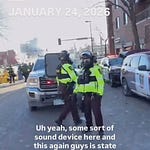In Utah’s Latino heartland, American-owned businesses are watching their livelihoods vanish under Trump’s deportation crackdown. The marketplace has gone silent.
By Nick Valencia | August 18, 2025
WEST VALLEY, UTAH— In a Republican state, in a Republican county, among voters who supported Donald Trump for President— small businesses are drowning.
West Valley is Utah‘s second-largest city. The street scenes here feel less like a postcard version of Mormon country and more like a slice of life portrait of East L.A.—kids in Nike Cortez, sneakers dangling from telephone poles, a neighborhood café and panadería alive with Latino culture.
In the shadows of Utah's mountainous peaks, broad avenues, and tidy suburban lawns—the state’s familiar scenery gives way to visible evidence of President Trump’s mass deportation policy. For all the talk from Republicans about protecting entrepreneurs, here in Utah’s Latino heartland there are dozens—hundreds—of American owned businesses grasping for air.
The Azteca Indoor Bazaar Swap Meet is the center of it all. A sprawling market, it hosts dozens of small business stalls with vendors selling items like jewelry, hats, and T-shirts— there’s even a barbershop offering line ups and fresh fades. In the back, a food court and stage wait for live bands and the weekend crowds.
Only today, there aren't any crowds. The vendors are all dressed up for people who stayed home.
The only real noise came from kids playing hide-and-seek between empty stalls while their parents stood idly at unmanned counters. These are the shopkeepers’ small children, spending their days racing through the aisles, growing up side-by-side weaving through marketplace clothing racks. But for how much longer? If there’s no work for their parents, those bonds fray too—and a community within a community is broken apart.
The Emptiness Tells a Story
West Valley has not endured the high-profile immigration sweeps seen in Los Angeles, and yet the specter of mass deportations looms over this city, home to one of the highest concentrations of Latinos in Utah. Families stay inside. Workers keep their heads down. Customers stop coming. The psychological toll is impossible to miss. Fear seeps into a community long before the raids.
Rolando Garcia, a vendor at Azteca Mall who has lived in the U.S. for 35 years, said fear has become routine.
“I’m an American citizen, but now I’m worried about everything that’s happening,” he told me. “Just imagine going out here in West Valley, leaving your home with fear and saying goodbye to your family because you don’t know what will happen.”
Garcia estimates his sales have plummeted by 50%.
“We depend on the Latino community,” he said. “Now there are some days I come in and I don’t even make $20. We’re small businesses, and this is hitting us very hard.”
His experience is echoed by other shopkeepers.
“Since this whole thing started with ICE, there are fewer people coming out because a lot of our clientele is Latino,” said Maria Perdoma, who runs a stand in the shopping center. “And so, yes, I think it’s due to the fear. The shopping center has been heavily affected.”
Jaime Ordoñez, another vendor, described a double bind: “The shopping center has not only been heavily affected because people have stopped coming, but the economy—it’s hard to find work. And ICE makes it even harder.”
“Trump Shutdown The Candyman?”
Then there is the immigrant candy shop owner who asked not to be named. Before President Trump took office, the man's store pulled in around $7,000 a month, he said. Today, he said he’s lucky if he clears $1,000.
For the past several months, the man—in his 60s—has survived by putting business expenses on credit cards. This month, he told us, will be his last.
That single case is devastating enough. But scale it outward to the 1000s of Latino-owned businesses in the state and the implications are staggering. What looks like a single candy shop closing its doors is, in reality, the visible tip of a much larger iceberg.
The president who claims to stand for small business has unleashed a policy that is strangling them into silence.













